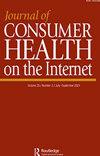Using Social Media to Discuss Chronic Pain: A Descriptive Study of TikTok Content
IF 0.7
Q4 PUBLIC, ENVIRONMENTAL & OCCUPATIONAL HEALTH
引用次数: 0
Abstract
Abstract Background Approximately 20% of individuals worldwide are affected by chronic pain, a condition defined by WHO as lasting more than 3 months. Although chronic pain is more prevalent in adults 65 years and older, it affects individuals of all ages. An estimated one-quarter to one-third of children experience chronic pain. Materials and methods One-hundred TikTok videos discussing chronic pain were analyzed using quantitative content analysis and descriptive statistics. Content categories were pre-determined based on CDC guidelines for prescribing practices for chronic pain and literature review. Data was recorded, managed, and analyzed using Microsoft Excel. Results Collectively, the 100 sampled videos received 99,133,350 views; 13,817,400 likes; 167,473 comments; and 310,301 shares. Five content categories were present in a majority of the videos: 81 videos were created by patients and 81 by perceived young adults (age 19–30), 58 mentioned a type of chronic pain, and 55 used music. Additionally, 78 videos did not recommend solutions for chronic pain. Discussion Young people are using social media platforms, such as TikTok, to discuss their personal experiences with chronic pain. Our study found that these videos were primarily ways for young adults to share personal stories of chronic pain, not to promote remedies. Understanding the content created by people suffering from inadequately treated conditions, like chronic pain, is important for those involved in caring for such patients.利用社交媒体讨论慢性疼痛:TikTok内容的描述性研究
世界范围内约有20%的人受到慢性疼痛的影响,世卫组织将慢性疼痛定义为持续3个月以上。尽管慢性疼痛在65岁及以上的成年人中更为普遍,但它影响所有年龄段的个体。据估计,四分之一到三分之一的儿童患有慢性疼痛。材料与方法采用定量内容分析和描述性统计对100个讨论慢性疼痛的TikTok视频进行分析。内容类别是根据CDC关于慢性疼痛的处方实践指南和文献综述预先确定的。使用Microsoft Excel记录、管理和分析数据。结果100个采样视频的总浏览量为99,133,350;13817400喜欢;167473条评论;310,301股。大多数视频中有五种内容类别:81个视频是由患者制作的,81个是由年轻人(19-30岁)制作的,58个提到了一种慢性疼痛,55个使用了音乐。此外,78个视频没有推荐慢性疼痛的解决方案。年轻人正在使用抖音等社交媒体平台来讨论他们与慢性疼痛的个人经历。我们的研究发现,这些视频主要是年轻人分享慢性疼痛的个人故事,而不是宣传治疗方法。了解那些患有慢性疼痛等未得到充分治疗的疾病的人所创造的内容,对于那些参与照顾这类患者的人来说非常重要。
本文章由计算机程序翻译,如有差异,请以英文原文为准。
求助全文
约1分钟内获得全文
求助全文
来源期刊

Journal of Consumer Health on the Internet
PUBLIC, ENVIRONMENTAL & OCCUPATIONAL HEALTH-
CiteScore
1.30
自引率
12.50%
发文量
32
期刊介绍:
The Journal of Consumer Health on the Internet is the only professional peer-reviewed journal devoted to locating consumer health information via the Internet. In this journal librarians and health information providers describe programs and services aimed at helping patients and the general public find the health information they need. From the Editor: "Studies have shown that health information is one of the major reasons that people worldwide access the Internet. As the amount of health information on the Web increases exponentially, it becomes critical that librarians-including public and medical librarians-be knowledgeable about what is available online and be able to direct users to reliable, accurate, quality information."
 求助内容:
求助内容: 应助结果提醒方式:
应助结果提醒方式:


